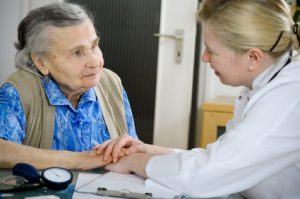 Dehydration is a term used to describe an excessive loss of water which disrupts the body’s normal functions. Dehydration takes place when an individual loses more fluids than they take in. The human body is constantly in a state of losing water. If fluids aren’t replaced, the body eventually does not have enough water available to perform natural bodily functions.
Dehydration is a term used to describe an excessive loss of water which disrupts the body’s normal functions. Dehydration takes place when an individual loses more fluids than they take in. The human body is constantly in a state of losing water. If fluids aren’t replaced, the body eventually does not have enough water available to perform natural bodily functions.
When an elderly individual becomes dehydrated, a number of symptoms and growing health concerns are likely to follow. If elderly dehydration is a consistent or chronic problem, health complications are likely to become severe or life-threatening. Chronic elderly dehydration is a common problem for many elderly patients in the United States.
Nursing Home Dehydration
Dehydration is among the most common forms of elder abuse and neglect associated with assisted living facilities. In one study, the fluid intake of 40 nursing home residents was monitored. The researchers found that nearly all of these patients were inadequately hydrated. Furthermore, the study found that 25 of the 40 patients had illnesses which may have been caused by or related to their dehydration issues.
Causes of Elderly Dehydration
The causes of nursing home patient dehydration vary depending on the case in question. Often, there are several reasons behind elderly dehydration which combine to make the situation worse. One issue affecting elderly dehydration could be a patient’s inability to voice his or her need for fluids. Additionally, it may not be possible for patients to voice their specific fluid preferences. Elderly patients who cannot vocalize their fluid needs or preferences may not be able to speak, or they may not be able to communicate in English.
Many reasons for nursing home dehydration are a result of inadequate elderly supervision and nursing home assistance. Often, support staff at nursing homes may possess limited training and experience. This is partially a result of the high level of turnover seen in the elder care assistant field. Additionally, elder care support staff do not always have an adequate level of supervision. For this reason, nursing home assistants may miss or avoid opportunities to offer fluids to elderly patients.
Elderly Dehydration Symptoms
Symptoms of dehydration can worsen over time. Although they may vary based on the exact age and background of the individual, most elderly dehydration symptoms are similar across all cultures and health conditions. These symptoms should be identified, treated, and monitored for the patient’s ongoing safety by a medical professional.
The following elderly dehydration symptoms are the most common and frequently indicate an early stage of dehydration:
– A dry and sticky mouth
– Thirst
– Dry Skin
– Decreased urination and urine output
Severe elderly dehydration symptoms can evolve into:
– Confusion and irritability
– Lack of sweating
– Sunken eyes
– Low blood pressure
– Rapid breathing
– Unconsciousness or delirium
Elderly Dehydration Complications
In the nursing home setting, elderly dehydration is often linked with malnutrition. Collectively, elderly dehydration and elderly malnutrition led to the death of approximately 1,400 nursing home residents between 1999 and 2002. The health complications that arise from elderly dehydration may be very serious, especially in cases where dehydration is frequent or chronic.
Elderly dehydration complications may include:
– Swelling in the brain: If a person consumes fluids after being dehydrated, the cells in the brain sometimes attempt to store water too rapidly. This can result in the damage and rupturing of brain cells.
– Seizures: Elderly dehydration can cause involuntary muscle contractions and also a loss of consciousness.
– Kidney failure: Elderly dehydration may prevent the kidneys from removing waste from the blood.
– Coma or death: If elderly dehydration progresses too far, it may result in the loss of a patient’s life.
Confronting Nursing Home Dehydration
Elderly dehydration incidents in a nursing home setting may come about as a result of abuse or neglect on the part of staff members. Patient hydration is a vital component to proper nursing home care. If a nursing home patient is not properly hydrated, the medical professionals enlisted with their wellbeing can be confronted and held accountable.
Sources:
Staff, Mayo Clinic. “Dehydration Complications.” Mayo Clinic. Mayo Clinic, 7 1 2011. Web. 13 May 2013. http://www.mayoclinic.com/health/dehydration/DS00561/DSECTION=complications
Kayser-Jones, J, and ES Schnell. “Factors contributing to dehydration in nursing homes: inadequate staffing and lack of professional supervision.” Journal of the American Geriatrics Society. 47.10 (1999): 1187-94. Web. 14 May. 2013. http://www.ncbi.nlm.nih.gov/pubmed/10522951
